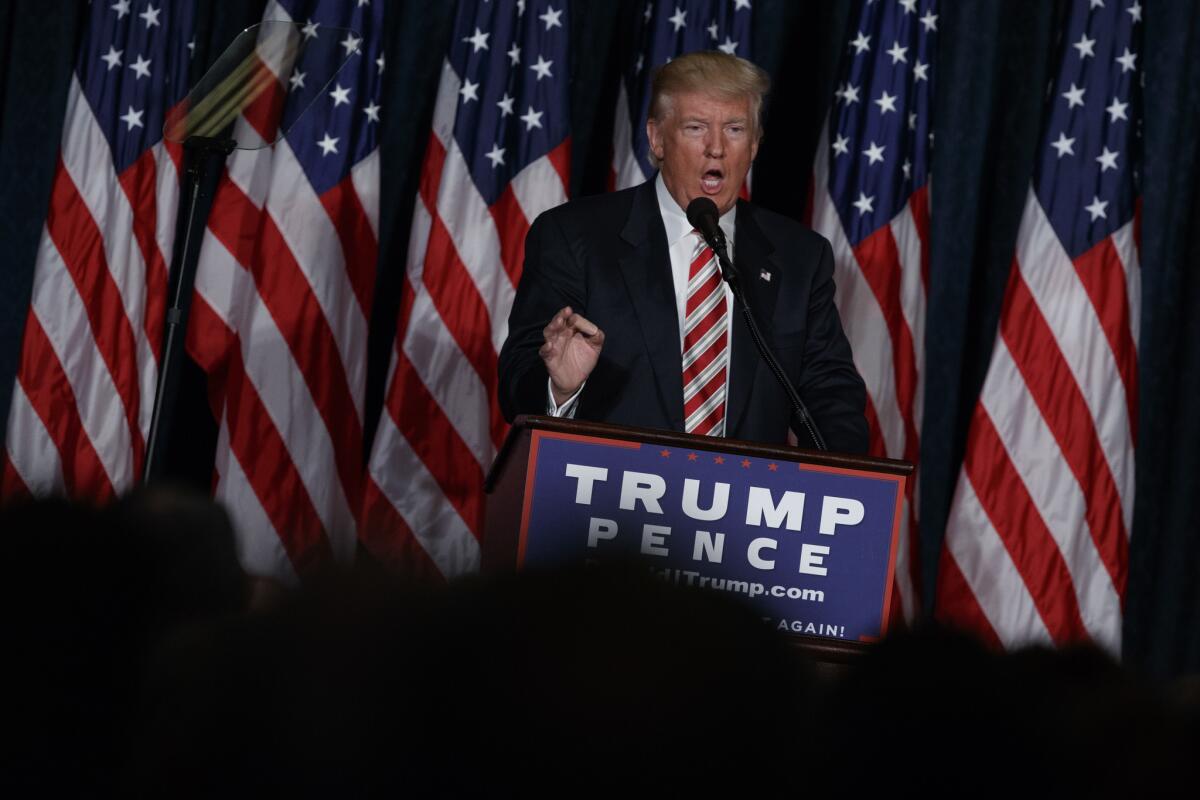Trump says he would restore hundreds of billions in military cuts, but it’s unclear how he’d pay for it

Donald Trump detailed a proposal Wednesday to restore hundreds of billions of dollars in military budget cuts if he is elected president — increasing the number of troops in uniform and ships in the Navy — while promising a strategy of “peace through strength.”
Though Trump’s plan also includes a pledge to build new warplanes and enhance missile defense and cybersecurity systems, he did not provide a price tag, and he offered only scant details on how he would pay the costs.
Trump has long called the state of the military a “disaster,” accusing President Obama of neglect. Trump, who delivered his military plan in a speech at Philadelphia’s august Union Club in front of six American flags, is wading into a budget debate that has at times consumed Obama’s second term.
“It is so depleted,” Trump said of the military, describing a Navy that has fewer ships, an Air Force that flies old planes and other perceived shortcomings. “We will rebuild our military.”
Trump also renewed a broader attack he has made on Hillary Clinton, calling her legacy as secretary of State one of failure, while promising that he would avoid foreign entanglements.
“Unlike my opponent, my foreign policy will emphasize diplomacy, not destruction,” he said. “Everywhere she got involved, things got worse.
Trump asserted that Clinton supported aggressive involvement in the Middle East to install democracy. Though Clinton did vote to authorize the war in Iraq while she was a senator, the Obama administration in which she served as secretary of State has been cautious in sending ground troops abroad, enduring sharp criticism, for example, for failing to use U.S. soldiers to stop the humanitarian crisis in Syria.
Trump also tried to flip the argument that Clinton has made about his temperament, asserting that she, not he, is unfit to lead the nation’s military. He pointed directly to Clinton’s private email server, and her assertion that she did not know she was sending classified emails on the account as evidence that she also cannot be trusted to protect the country from cyberthreats. He emphasized that his plan would improve cybersecurity and enforce laws against mishandling classified information, a reference to his prior statements that she deserved to be prosecuted.
“She’s trigger-happy and very unstable,” he said.
Trump described his overarching philosophy as “peace through strength,” a mantra used by many leaders, including President Reagan, to describe employing the threat of a robust military to deter attacks from enemies.
Obama, too, has repeatedly called on Congress to end the mandatory federal spending cuts that were imposed as part of a last-resort deficit deal in 2011 that was intended to be so unpalatable to Republicans and Democrats alike that they would never be enacted.
But the so-called sequestration cuts — $1 trillion worth of deep reductions over the decade, hitting almost every aspect of government — took effect in 2013 after lawmakers failed to reach a compromise to avert them.
Republicans in Congress have supported ending the military portion of the cuts, but have failed to strike a permanent deal with Obama, who demands that domestic spending be restored as well.
If Trump wins and Republicans keep control of Congress, he could accomplish the goal without restoring other domestic spending cuts. But it would add about $500 billion in spending over the next 10 years unless other cuts are made.
Those costs could increase substantially, depending on the size and scope of other promises Trump made Wednesday to expand the U.S. fleet.
Trump said he would pay for the new spending through a combination of collection of unpaid taxes, attrition in federal government jobs and by halting funding for expired laws. Trump also renewed his call to force such allies as Japan, Germany, South Korea and Saudi Arabia to pay more in exchange for U.S. military protection.
He offered few specifics on how, for example, he would hunt down tax cheats or which government programs he would kill.
Trump also said he would ask generals to submit a plan within his first 30 days in office to defeat the Islamic State extremist group, something the military has been working on for years.
Though current and former commanders agree that sending thousands more troops to Iraq may hasten the Islamic State’s defeat there, many worry that its long-term effects would not be in the U.S.’s best interest.
Obama, who swept into office promising to end two U.S. ground wars, has decided to take an advisory role against the Islamic State, which involves training local forces, launching daily airstrikes and providing financial support to allies in the region.
Although the administration has been hesitant to dedicate more troops to the fight – on top of the 4,600 already there – the U.S.-led military coalition has seen progress in recent months.
The Islamic State was routed this week from its last stronghold by the Turkish border, which helped close off a boundary region that was crucial for movement of recruits, supplies and money in and out of the group’s quasi-state. It was the latest battlefield victory for the U.S.-led coalition, which recently scored victories in Jarabulus and Manbij in northern Syria, and Khalidiyah and Qayyarah in western Iraq. They previously were ousted from Hit, Al Hawl and Rutbah in Iraq.
While the militants still detonate car bombs or launch suicide attacks each night in Baghdad, they have lost half the territory they once controlled in Iraq. And Iraqi and U.S. officials say the long-delayed assault on Mosul, Islamic State’s self-declared capital in Iraq, may be launched this fall. The city of 1 million has been increasingly cut off by advancing Iraqi and Kurdish ground forces.
Twitter: @noahbierman
ALSO
We’ve updated our Electoral College map: What’s new?
Donald Trump still has a path to victory, but it’s a tough one
In Pennsylvania and nationally, Trump’s problems with suburban voters blunt his ascent
UPDATES:
1 p.m.: This story was updated with comments from Trump’s speech.
This story was originally published at 10:05 a.m.
More to Read
Get the L.A. Times Politics newsletter
Deeply reported insights into legislation, politics and policy from Sacramento, Washington and beyond. In your inbox three times per week.
You may occasionally receive promotional content from the Los Angeles Times.








